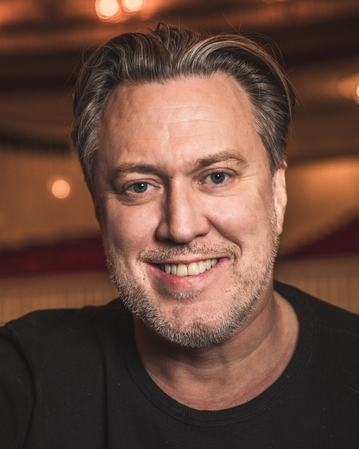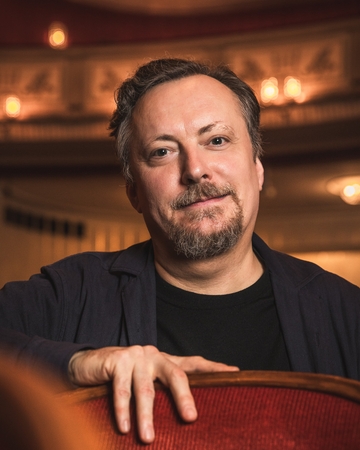When three artists serve the message
Interview |
For a decade and a half now, the opera program at the Vienna State Opera has been supplemented by regular solo concerts by renowned singers. However, the evening on January 8 clearly deviates from the usual pattern:
Instead of one performer with a conventional program of arias and songs, this time the audience can expect an artistic discourse carried by three stage greats: Together with the baritone Georg Nigl, who has recently taken on central roles in several new productions at the State Opera, among others, the celebrated Austrian chamber actor Nicholas Ofczarek and the sought-after conductor Vladimir Jurowski at the piano will perform a program entitled "Die letzten Tage der Menschlichkeit?" (The last days of humanity?) Juxtaposing texts by Karl Kraus with music by Gustav Mahler and Hanns Eisler. To give the audience a little insight into the ideas and direction of the concert in advance, Andreas Láng interviewed the two creators of this extraordinary evening, Georg Nigl & Nicholas Ofczarek.
Who took the initiative for an artistic collaboration and how should we imagine it? Do you go on a joint search? Or do you only meet when one of you has a brilliant idea?
Georg Nigl: Nicholas and I had been in loose contact since the 1990s, just before he came to the Burgtheater. And I noticed his incredible talent for theater right from the start - so the desire to create something artistic with him came about of its own accord, so to speak. We realized just how much we were on the same wavelength on a train journey from Vienna to Munich, which brought us together again by chance.
Actually, we should have taken it easy on each other and our voices, as we were both only a few hours away from a performance, albeit on different stages. But the conversation was like a lively firework display from the very first few seconds, in which we served up punch line after punch line, just like in a competition. It was probably our funniest train journey ever and I fear that our laughter could still be heard in the next compartment but one. In any case, Nicholas said goodbye with the words: "4:1 for Nigl!" - which inevitably called for a rematch. After a few more meetings, we became more or less one and began to make all sorts of plans together, the first of which was this evening at the Vienna State Opera.
Personally, I often come up with long sought-after solutions to artistic questions or ideas for new projects while listening to music. When do you have your creative spurts?
Georg Nigl: Preferably while ironing or in the shower.
Nicholas Ofczarek: In the silence of the night.
"It's not about competition, but about three artists serving the content together on this evening."
And how was Vladimir Jurowski integrated as a pianist?
Georg Nigl: I consider him to be one of the most interesting conductors at the moment, who, like few others, honestly sets out to realize the composers' intentions in the best possible way, to interpret the respective creations for the audience - in other words, to translate them in a figurative sense. In other words, he is a true servant of the cause. When I was able to experience him as a fabulous pianist during the rehearsals for Fledermaus in Munich, which he conducted, I simply asked him if he would like to take part in our project. And since he happily agreed, our triumvirate is now complete.(laughs)
Whose idea was it to combine the texts of Karl Kraus with Mahler and Eisler?
Georg Nigl: That came from me. Kraus' Letzten Tage der Menschheit has been on my mind for a long time. And the fact that this work is considered unperformable also appeals to me, because in such a case I immediately start thinking about how it could be realized. In addition, I don't see the classical form of the lieder recital - a singer performs with a single accompanist and sings something - as a natural necessity in terms of genre. Why not a combination with a chamber music ensemble or even with an actor who recites texts between the songs?
However, a concert dramaturgy in which, for example, certain works by a poet are first read aloud and then the corresponding musical setting is sung seems somewhat uninspired to me in the long run. Instead, I would like to unite texts and music that have something to do with each other on additional levels, that reflect each other and evoke associations in the listener. Simply telling a story for the sake of telling a story was not enough for all of us. Rather, we wanted to find connections between the texts and the compositions, to create new food for thought. And with this program, I think we have succeeded in doing that.
Is there a certain regularity to the sequence of lyrics and music? For example: one song, one text, or two songs, two texts?
Nicholas Ofczarek: That would be boring.
Georg Nigl: Especially as the difference between spoken and sung text is not that big for me. Good lyrics are music per se and vice versa: when I sing songs, I recite them at the same time.
So all three of you stay on stage throughout? The singer and the pianist don't leave when the actor is performing a text?
Georg Nigl: No, I stay on stage and listen when it's not my turn to be inspired by the situation. That's what creates the common ground.
Nicholas Ofczarek: In other words, we give each other the focus.
"I want to combine texts and music that have something to do with each other on additional levels, that reflect each other and evoke associations in the listener."
Can such an evening of three artists - even if only in the bud - create something like a sense of competition?
Georg Nigl: I'm not interested in winning! I never feel any competition in my artistic work, so there is no danger of that on this evening either. Rather, I'm delighted to be on stage this time with a Haberer whom I really appreciate, with a Haberer who I know will create wonderful, unpredictable artistic moments that I can pick up on and develop further, which he in turn will then take over. You depend on each other and look out for each other. That doesn't work with everyone!
Nicholas Ofczarek: It's not about competition, it's about three artists working TOGETHER on this evening to serve the content.
Can there be mutual criticism?
Nicholas Ofczarek: Not must: it must!
Georg Nigl: Absolutely - as long as it's tender.
What do you prefer: applause after each individual program item or only after a larger block?
Nicholas Ofczarek: I don't think about that.
Georg Nigl: I can't influence whether the individual people in the auditorium are affected or think about whether they'd rather drink wine than beer during the interval. But basically I prefer a reaction at the end rather than after each individual number.
The concert is subtitled "The last days of humanity?" The question mark raises the possibility that these may not be the last days after all. Is the question mark a utopia, a hope or a possible reality?
Nicholas Ofczarek: Let the audience decide for themselves!
Georg Nigl: A question or a question mark does not necessarily expect or hope for an answer. We live in a time in which many things change very quickly. We are constantly bombarded with situations and images, but have relatively few opportunities to listen or at least define the common situation. This frightening pace, this sensory overload, reinforces in many of us a focus on our own progress and survival. What is being lost as a result is humanitas, or humanity.


